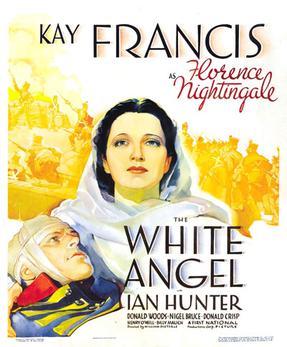THE WHITE ANGEL
Biopics, particularly of historical figures that people hold up in lofty terms, can run the risk of being very stiff. Gandhi is one such case. Another is The White Angel, the biographical film of Florence Nightingale. It is not that The White Angel is bad, per se. It is that it mistakes nobleness for insight, preferring to idolize The Lady with the Lamp rather than reveal her inner light.
Upper-class society lady Florence Nightingale (Kay Francis) wants to become a nurse. This shocks her family and friends, as nursing was seen as a disreputable profession, particularly for well-born women such as Nightingale. Nurses were thought of lazy, lax and drunks, closer to prostitutes than caregivers. Florence, however, will not be denied her dream profession. Convinced that she can bring needed reforms, order and respectability to the profession, Florence goes to train as a nurse and yet continues to struggle against the stigma of her chosen profession.
Now comes the Crimean War, and Florence is appalled at reports of the high mortality rate among the wounded versus those who have died in battle. This is the ideal place to test out her various theories on nursing and the effectiveness of proper medical care. She is still fiercely opposed by the British high command, especially Dr. Hunt (Donald Crisp), who sees her as nothing but a society doyenne with nothing to offer and the entire concept of female nurses' repellent. Finally showing some gumption, Florence will again not be denied. She is willing to tough it out, even when she is stricken with cholera herself. Will her efforts, however, be in vain? Will Queen Victoria see Florence Nightingale as a positive or negative force?
The worst thing that a biographical film can do is make the subject either too good or too bad. The Reagans television movie is a good example of the latter, making the fortieth President and First Lady almost cartoonishly satanic. A good example of the former is The White Angel. This Florence Nightingale almost floats over the world, forever noble, forever quietly courageous. Ethereal is the best way to describe the Florence Nightingale in The White Angel. The film makes the case that our Flo essentially will give her life to humanity by being a nurse.
I found so much of the acting and Mordaunt Shairp's screenplay so still and noble as to be maddening. I am surprised that director William Dieterle could not get his cast to make the real-life and composite characters come across as real. It seemed a real shame that The White Angel opted for deification versus exploration of the subject.
It is not as if there were not some flashes of what The White Angel could have been. Late in the film, Florence is told that she cannot have the blankets and shirts that she requires for the men under her and her staff's care. Genuinely angry, she defies the guards and essentially commandeers the supplies over their firm objections. However, for the most part, this Florence Nightingale is very noble in her manner, almost wallowing in her sacrificial manner.
Such is the case when she is told that she cannot enter to see a general. She therefore waits patiently outside in the snow rather than leave. Perhaps this could have been made into a moment of defiance and quiet strength. The White Angel could not make the case that it was such a moment.
I think Kay Francis showed herself to be a beautiful woman in The White Angel. I do not blame her for her portrayal of Nightingale as the embodiment of nobility. That is more on Dieterle's directing and the screenplay, which gave her an almost absurdly noble and saintly figure. She did have some good moments, including her interactions with Tom (Billy Mauch), a literal little drummer boy whom she nursed back to health who later stood up for her.
The film also has a strong moment when the men salute Nightingale as she is carried out when she is suffering from cholera. There was also some good acting from Crisp as one of her many antagonists. For the most part though, The White Angel bungles the opportunity to show the full woman behind the legend. It is not that one is looking for some damning expose of Nightingale. It is that one would like to see a more complex figure than the one we were shown.
Florence Nightingale was truly ahead of her time. She saw a desperate need and defied convention if something needed to be done. The White Angel may not be a good film, but perhaps it can be an introduction to this most important of figures and to the beauty of Kay Francis.
 |
| 1820-1910 |



No comments:
Post a Comment
Views are always welcome, but I would ask that no vulgarity be used. Any posts that contain foul language or are bigoted in any way will not be posted.
Thank you.